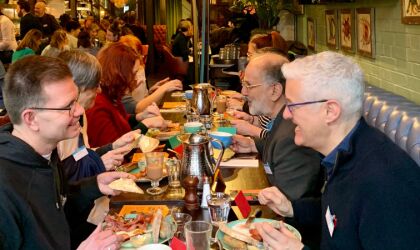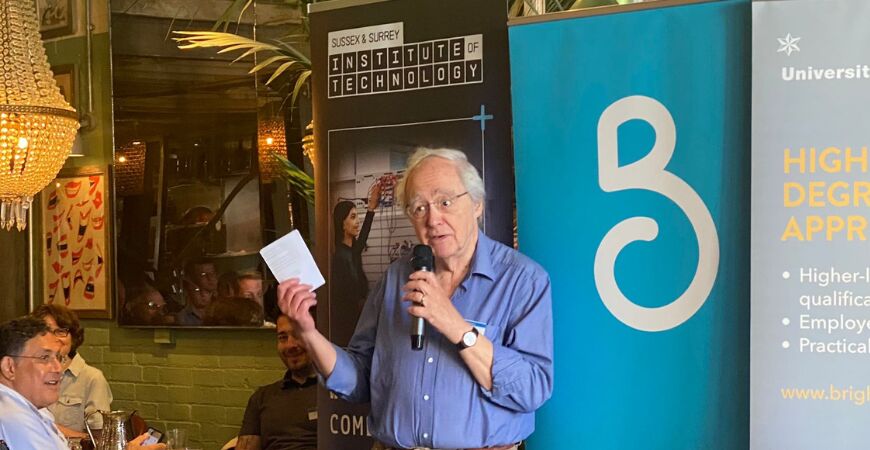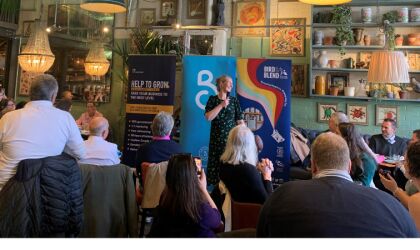

Fri 30 / 06 / 23
The 'History' Breakfast
Leah Mooney from Pier Pressure writes up the key takeaways from our June Chamber Breakfast. We heard from guest speaker David Fisher, Chair of the Regency Society, about the past and future of Brighton as a city.
By Leah Mooney of
This breakfast at Bills turned out to be somewhat ironically named as speaker David Fisher, Chair of the Regency Society, is actually more concerned with the future than the past. Despite its name and long history, the Regency Society is looking to the future of Brighton and its architecture with a view to making it a better place to live for everyone. A little about David Fisher first, however.
Somewhat taken aback by his introduction to the room, David explained that, despite his years of teaching at Warwick University, he did not see himself as an academic. Spending most of his career as a journalist and editor of publications concerned with documenting progress, it’s hardly surprising that he would be drawn to the Regency Society which is interested in preserving the past to help steer progress in the future. David jokingly remarked that he was the oldest person in the room and pointed out that his age was very much the average amongst the Regency Society.
The age demographic of the Regency Society makes sense when you look at its history. The idea for it was formed in 1939 by two men, DL Murray and Anthony Dale. The society’s primary aim was to halt what they saw as the wanton destruction of some of Brighton’s finest architecture. Plans were in place to demolish the Brunswick Estate and the Pavilion to make way for new flats and a new town hall. Clearly, a world-changing event took place in 1939 that put their plans on hold. However, in 1945, with WWII over, the Regency Society was established. Due to the campaigning and hard work of the society, the Brunswick Estate was saved and the Pavilion restored.
One aspect of Anthony Dale’s work which the modern Regency Society isn’t so keen to emulate was his objection to Victorian architecture. David remarked that the name was somewhat misleading nowadays as they were not solely focused on the Regency era and had great appreciation for the Victorian buildings around the city. He also pointed out that the most prolific house building time in Brighton was actually between around 1895 and 1905 when areas like the terraces around Queens Park were built and that housebuilding on this scale was a good thing. However, he was critical of the way the city has been maintained since then and highlighted how some sites had been left as either ruins or vacant lots for far too long. An example he gave was of a site in Jubilee Street which was ordered to be cleared in 1939 but was left vacant until the new library was built on it in 2005.
David explained a major principle of the Regency Society was to make the city and its architecture as good as it can be without getting into unachievable ideals. He did not believe in mimicking Regency architecture or in opposing modernity. Regency architecture was, after all, cutting edge at the time so he believes this spirit should be maintained - tearing down the old isn’t necessary for progress. The process of splitting up the grand Regency buildings to better suit modern life, where people no longer had large households with lots of servants, began in around 1907. The Regency Society are very much in favour of this kind of repurposing and reusing older buildings rather than replacing them.
Rejigging older buildings and making them more suitable for modern life is the sort of ‘future thinking’ David was keen to highlight as an aim for the Regency Society. This is where it is more about the future than the past as they get involved with planning for new buildings and want to help influence planners and developers to make the city better for everyone. They want developers to think beyond their individual buildings and consider the surrounding areas and neighbourhoods as a whole. David believes a way we can learn from the past is the way previous housebuilders created neighbourhoods. More modern housing develops, he says, often consist of long roads with few cut throughs and centralised shopping parades rather than shorter streets with local shops and pubs people could use and congregate in.
This idea of easily accessible neighbourhoods is a hot topic in the news and on social media at the moment with the concept of ’15 minute neighbourhoods’ being discussed. David would like to see much more of a focus on creating neighbourhoods in the future to help people feel safe and part of an integrated community. He believes one of the major roles of the Regency Society should be to make people more aware of their environment and for individuals and organisations to work towards making it better for everyone.
One of the ways David is working towards achieving this is to encourage greater involvement with local schools, universities and businesses to share ideas both big and small about how the city could be improved. He would very much like to hear from any businesses who would be interested in sponsoring such an initiative.
A big thank you to David Fisher, Chair of the Regency Society, for speaking at our June Chamber Breakfast. You can find out more and get in touch on their website.
And to Leah Mooney, Marketing Manager at Pier Pressure - Brighton's award-winning escape rooms. Find out more here.
For our monthly Chamber Breakfasts and more networking events to inspire and build your network, head over to our events page.
If you want to contribute to the Chamber blog, contact us on hannah@brightonchamber.co.uk



